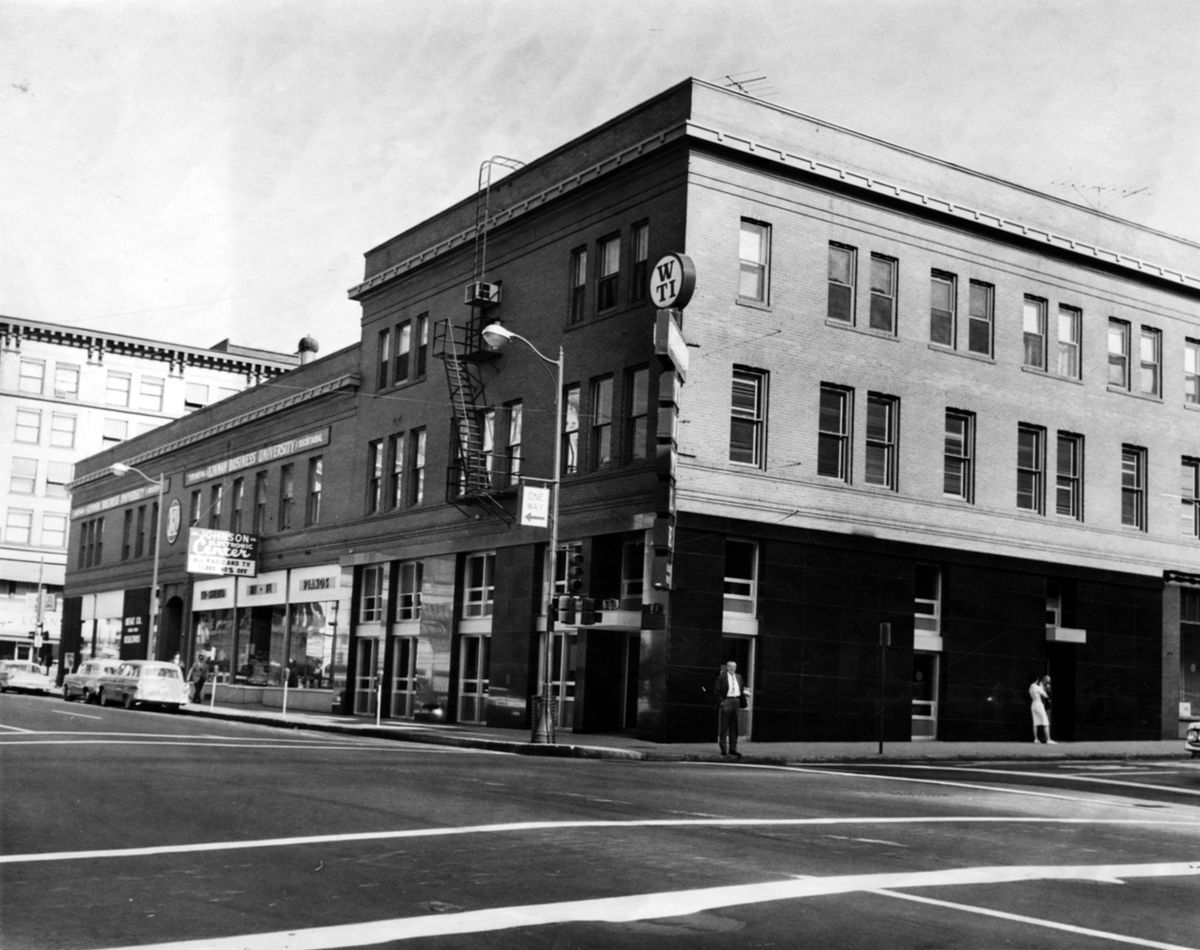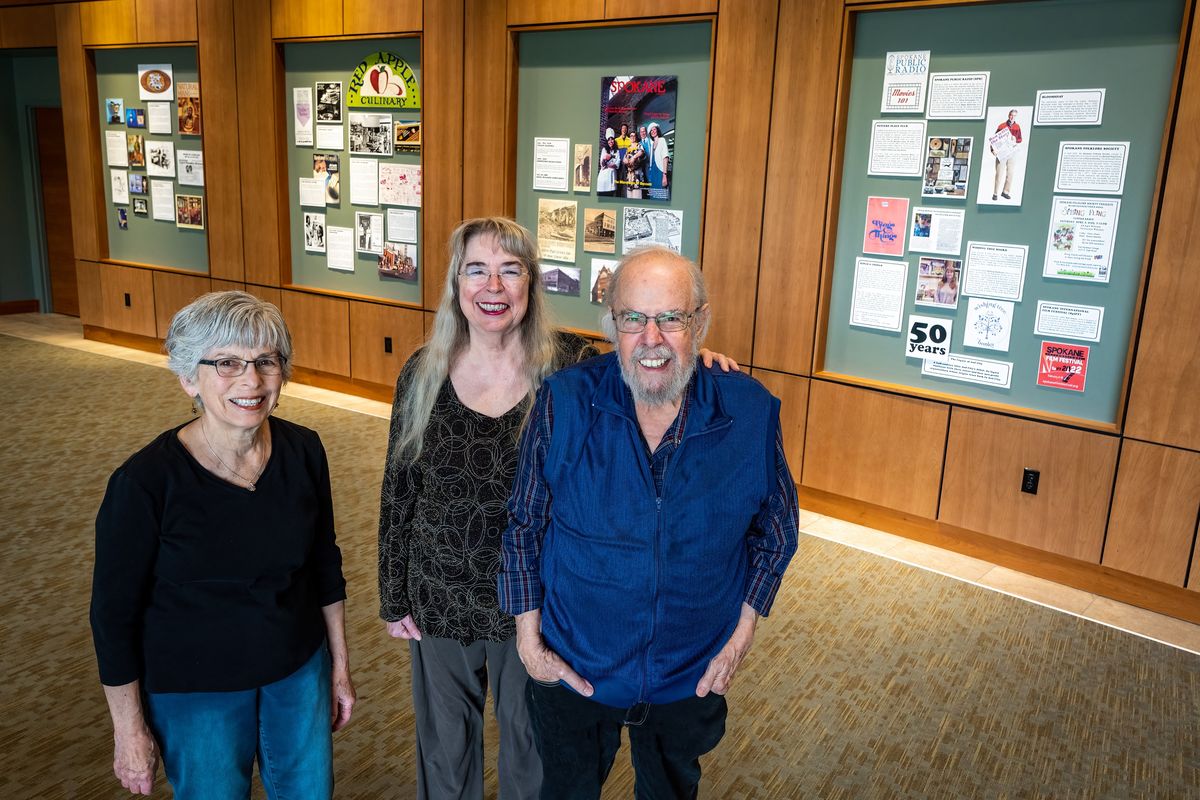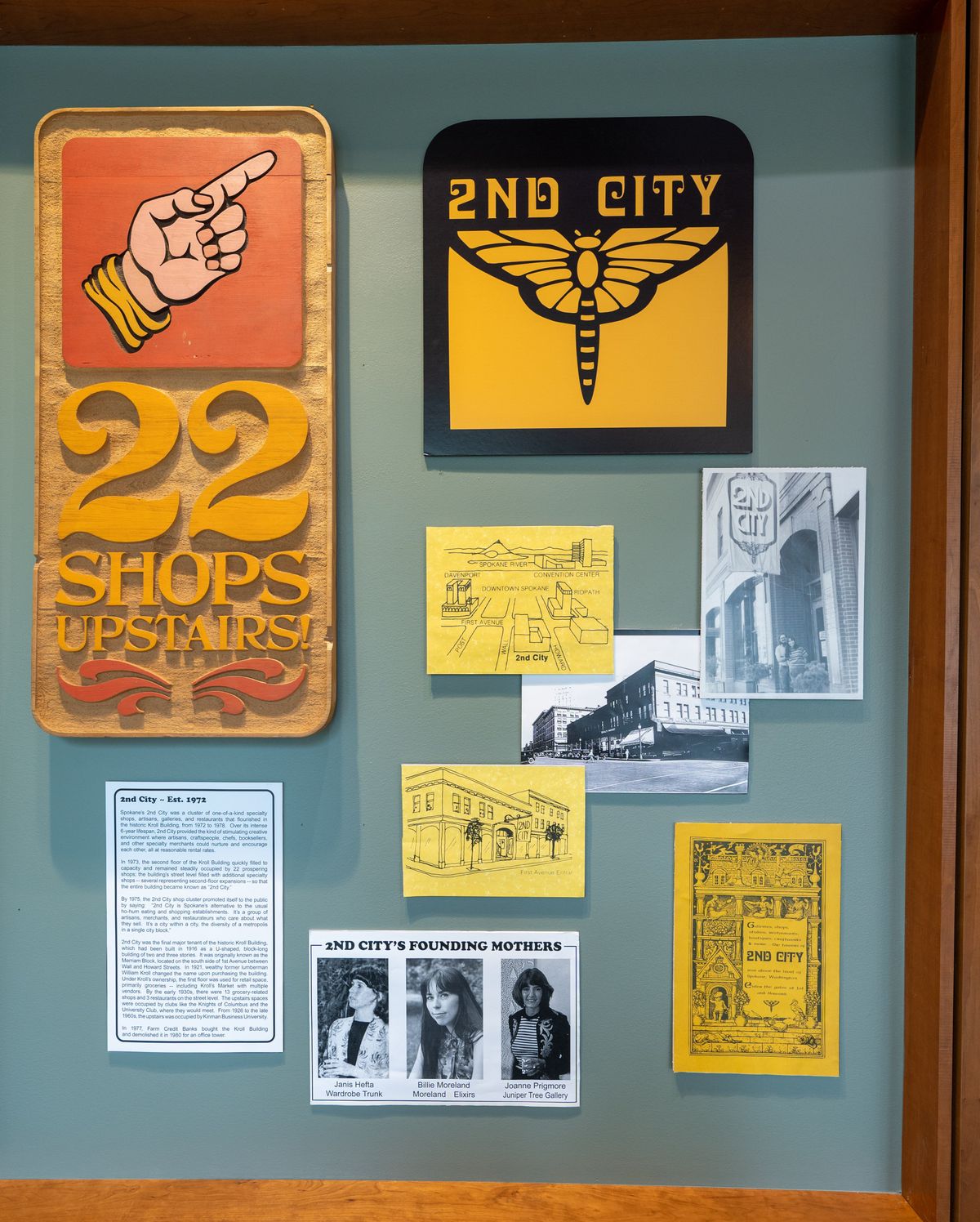Memories of Spokane’s first business incubator, 2nd City, live on through exhibit 50 years after it opened
Former 2nd City business owners Judy Hamel, left, founder of the Children’s Corner Bookshop, and Billie Moreland with her husband Steve Simmons, founders of Moreland’s Restaurant and Coffee Co., created an exhibit at the Rockwood (COLIN MULVANY/THE SPOKESMAN-REVI)
More than 50 years ago, Billie Moreland, Janis Hefta and Joanne Prigmore had an idea to join together to create an arts and small business cluster in Spokane.
Hefta owned a women’s clothing boutique, the Wardrobe Trunk, and Prigmore owned the Juniper Tree Gallery. Moreland was working to open a store selling coffee beans, teas and spices.
The business owners knew that forming a cluster of shops would help their businesses thrive through collaboration and shared foot traffic, rather than if they were scattered throughout the city.
The three entrepreneurs found a home in the since-demolished Kroll Building on First Avenue between Howard and Wall streets in downtown Spokane.
“I don’t know how we got so lucky,” Moreland said. “But we found the Kroll Building and its wonderful landlord, Dave Clack. It had been recently vacated by Kinman Business University, so it had a number of classroom-size, open uncluttered spaces. And we thought it was perfect. Except it was too big for three shops.”
Moreland, Hefta and Prigmore found eight other businesses to join them.
The cluster of 11 businesses opened in June 1972 as 2nd City. It became a neighborhood of one-of-a-kind specialty shops, artisans, galleries and restaurants as well as a place where business owners could support and encourage each other while paying reasonable rents.
“It was only six and a half years, but it was a really dynamic place,” said Judith Hamel, who operated the Children’s Corner Bookshop at 2nd City with business partner Susan Durrie. “So many people were able to start businesses there.”
The impact to the local business community goes far beyond the six and a half years 2nd City was in operation. More than 47 businesses were a part of 2nd City, including the Human Race, a former running store co-owned by Bloomsday founder Don Kardong, and Rings & Things, which is celebrating its 50th anniversary this year.
Hamel and Moreland and her husband, Steve Simmons, are looking to preserve 2nd City’s history via an exhibit on display though Wednesday at Rockwood South Hill’s gallery walk, 2903 E. 25th Ave.
“We did a lot of research and it kind of came together. A lot of people contributed to this and I’m so grateful,” Hamel said, adding that Rockwood Retirement Communities Communications Coordinator Lisa VanMansum assisted with the graphic design of the exhibit.
A city within a city
After opening in 1972, 2nd City gained momentum with retailers selling items such as screenprinted clothing, poetry books, metal sculptures and more.
Based on the retail momentum, Clack remodeled space in the building, providing a new west wing of retail space on the second floor and improvements to the ground floor.
In 1973, the Kroll Building’s second floor was at capacity with more than 22 tenants occupying the space.
The building’s street level also was filled with specialty shops, some of which were expansions of retailers on the second floor.
The cluster of shops promoted itself as an alternative to the “usual ho-hum eating and shopping establishments,” according to the 2nd City exhibit.
“It’s a group of artisans, merchants and restaurateurs who care about what they sell,” 2nd City shop owners wrote in the exhibit at Rockwood. “It’s a city within a city, the diversity of a metropolis in a single city block.”
During Expo ’74, visual arts and music expanded at 2nd City, with folk and bluegrass concerts, brass bands, poetry readings and children’s theater performances held at the building’s auditorium.
Spokane’s first business incubator
Bloomsday’s Kardong opened the former Human Race running store with business partner Rick Riley in 1977 at 2nd City.
“You could really start a business in 2nd City with almost no capital, depending on your product,” he said. “We pooled limited resources and we were able to be in business. It was a very good business incubator in that sense.”
Kardong said 2nd City provided a foundation for learning how to operate a business.
“Most of us didn’t have a business background and weren’t likely to be able to go to a bank and get funding,” Kardong said. “But we were able to get started there and prove ourselves and when we did go ask for funding from a bank, we could show we knew what we were doing.”
Kardong added that 2nd City was a unique concept for Spokane.
“I don’t know of anything now that is sort of like what 2nd City was in Spokane,” he said. “To me, it was really important because some of those businesses were around for many years afterward and filled a variety of needs in the community. It added a lot to the life of the city.”
Kardong and Riley operated the Human Race until 1986, when they sold the business to Curt Kinghorn. He rebranded it Runners Soul, which closed in 2019.
The late Russ Nobbs founded Rings & Things at 2nd City in 1972. Nobbs sold handmade jewelry and later added bead and fine jewelry shops. Eventually, Nobbs closed his retail shops and created a large bead and jewelry wholesale business that continues today under leadership of his daughter, Polly, and son Skylar.
“I think that’s a really important thing to note that it was a people incubator,” Simmons said of 2nd City. “They didn’t have much experience or knowledge when they started, but they learned a lot. Almost all the creative people at that time went through 2nd City.”
Hamel and Susan Durrie opened the Children’s Corner Bookshop in 1973 in 2nd City, which offered an opportunity to test the water of operating a business.
“If you want to open a bookstore today, like Wishing Tree Books … it’s a huge investment,” Hamel said. “But 2nd City provided an opportunity where you could try out running a retail business without losing your shirt.”
The Children’s Corner Bookshop drew customers from British Columbia, Montana, Idaho, Oregon and Washington . Hamel and Durrie also hosted book fairs for elementary schools in the region.
“It was just a very unique opportunity and I’m so grateful to the three women who had this idea and to Dave Clack,” Hamel said of 2nd City.
The Children’s Corner Bookshop later relocated to River Park Square in 1978 and remained open until 2004. Its legacy continues, however, as former part-time employee Janelle Smith went on to open Wishing Tree Books in the South Perry District.
Moreland Elixirs began as a shop that sold coffee beans, tea and spices, but evolved into a restaurant as customer demand increased for Moreland’s soups, stews, salads and pastries.
Moreland also prepared dishes that weren’t found anywhere else in Spokane and desserts such as Kentucky butter cake, Cassata Siciliana, and Schwartzwalder Kirschtorte.
“There was a lot of good things introduced, like Molinari’s San Francisco salami and Boursin cheese,” Moreland said.
When Clack remodeled the Kroll Building, it provided Moreland Elixirs room to expand as shops relocated to the west wing. The business was renamed Moreland’s Restaurant and Coffee Co. It added dinner service, including beer and wine and a French-inspired menu.
In 1977, Farm Credit Bank purchased the Kroll Building with the intention of demolishing it to build an office tower. Some retailers relocated from the building to River Park Square, while others, such as Moreland’s Restaurant and Coffee Co., found a new home at the Bennett Block.
The Kroll Building was demolished in 1980. The site on First Avenue is now occupied by the Wells Fargo Center building.
Preserving history
Simmons hopes the Northwest Museum of Arts and Culture would be willing to preserve portions of 2nd City’s history. He has kept an original 2nd City banner, brochures and trinkets from the business cluster’s heyday.
Carol Summers, spokeswoman for the MAC, said in an email staff has visited the 2nd City exhibit at Rockwood South Hill and “thought it was very good.”
“While our history curator and archives staff told me that they are interested in capturing the history of Second City, they don’t know what form that will take at this point,” she said.
Hamel also would like to see the 2nd City exhibit displayed beyond Rockwood South Hill. She is hoping the MAC will use the exhibit in conjunction with a retrospective on Expo ’74 in 2024.
“People have strong ties to these businesses,” Hamel said. “And I think we’re all fortunate to be part of that.”





